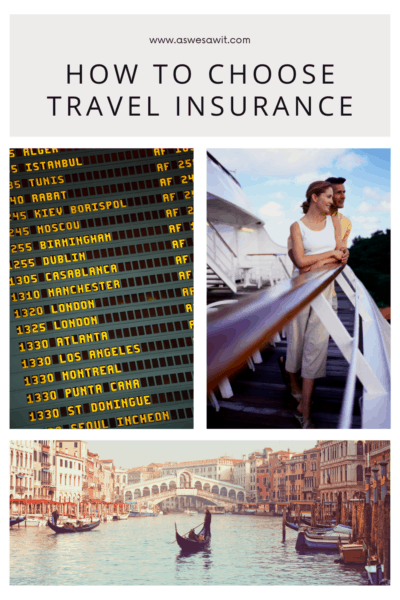On New Year's Eve 2019, the WHO's China office received reports of 44 patients who were ill with "pneumonia." A week later, WHO published the first Disease Outbreak News about the still-unidentified virus.
Fast-forward to March 11, 2020, when the newly named COVID-19 coronavirus was officially declared a global pandemic.
Here we are - a year and a half later - and COVID-19 is still very much a part of our lives. Borders and businesses are finally reopening, and the world is trying to get back to normal. But let's face it: We still have a long way to go.
The good news is that lots of us are able to make travel plans during COVID and get back to doing what we love. However, with so much uncertainty in the world, you might be wondering about travel insurance.
Is it a good idea to get pandemic travel insurance? Is COVID-19 covered under most travel insurance plans? What else do you need to know to travel safely and securely during the pandemic?
We'll answer these important questions and much more, so keep reading below.
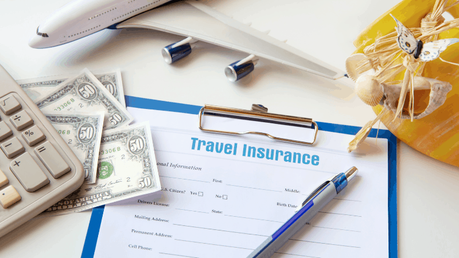
Do you need pandemic travel insurance?
Prior to the pandemic, more than 41% of Americans and 38% of British holidaymakers opted not to buy travel insurance for a vacation abroad. The number one reason was that it's "too expensive," although the average policy cost in 2017 was only $46.
Unfortunately, many travelers learned the hard way that emergencies overseas can cost a lot more than $46. The same source reveals that travelers without insurance who had to visit a hospital abroad averaged $1,295 in medical expenses.
Fast-forward to 2020 and a raging worldwide pandemic. You might think everyone willing and able to travel would purchase travel insurance to protect their trip, but what do the facts reveal? In reality, only 23% of travelers planned to insure their trip, while another 21% were "considering" it.
It's too soon to know any stats for 2021 yet. But even as borders reopen and international travel ramps up again, the threat of COVID-19 is still present. This is in addition to the other types of medical emergencies, accidents, or unforeseen events that can occur.
Even if you don't contract COVID-19, a million other things could happen before or during your vacation. You could slip on stairs and break your arm. Your resort could get rocked by an earthquake. Or you could unexpectedly get kicked out of a country, like we once did.
No wonder wise travelers understand the value of protecting their trip with travel insurance. The answer to the question, "Do I need pandemic travel insurance?" is 100% yes!
Is there a specific "COVID-19 travel insurance?"
Like other types of insurance, it can be tricky to understand exactly what's covered (and what isn't) by travel insurance. Up until January 21, 2020, when COVID-19 became an official named event, most policies did not cover cancellations or illness due to the virus.
However, as the pandemic spread and travel all but came to a halt, things quickly changed.
Most insurance policies purchased after January 21, 2020, now include provisions for COVID-19. In others words, COVID-19 is now a covered reason for trip cancellation, medical evacuation, and other common policy inclusions.
Of course, for any travel insurance policy you're considering, it's vital to read the small print. The last thing you want to do is assume that something is covered, only to find out (the hard way) that it's not. If in doubt, ask for clarification about their coverage options, including what happens if COVID-19 impacts your travel plans.
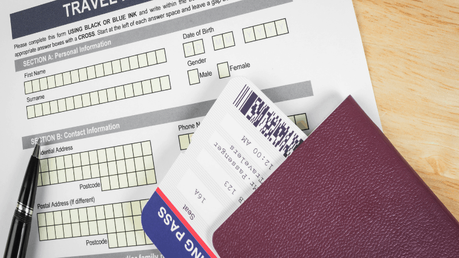
Benefits of pandemic travel insurance
There may not be a named "pandemic travel insurance" policy, but comprehensive coverage will protect you in a variety of situations. Ultimately, it's up to you to do your research and find the policy that best suits your budget and needs.
To help you in your efforts, let's discuss five common inclusions in travel insurance plans and how they could relate to COVID-19.
1. Medical emergencies
None of us like to think about the possibility of getting sick while we're on holiday, but it happens more often than you'd think. For one Australian travel insurance company, for example, over 25% of claims were for emergency medical or dental treatment overseas.
Of course, the likelihood of getting sick depends largely on your destination. Another study found that travelers to developing countries had a 0.3% chance of landing in the hospital either during or immediately after their travels.
COVID-19 aside, anything can happen while you're on the road. You could lose a tooth, get food poisoning, sprain an ankle, or get bitten by an animal. There's always the possibility that someone could have a medical emergency back home, too, forcing you to cut your trip short.
What's the point? The few dollars you'll spend on emergency medical coverage pale in comparison to what you could actually have to spend if you get sick or injured. Really, there's no price you can put on peace of mind.
If you get COVID-19 while you're traveling and need medical treatment, this will likely be covered by your policy. The same is true if you test positive right before your trip and you're unable to travel.
Here's one more thing to consider: Since the pandemic started, many destinations now require travelers to carry emergency medical insurance. In some cases, they require proof that you have at least $100,000 in coverage. Depending on the policy you choose (and your destination), you might consider purchasing up to $5 million in coverage - just in case.
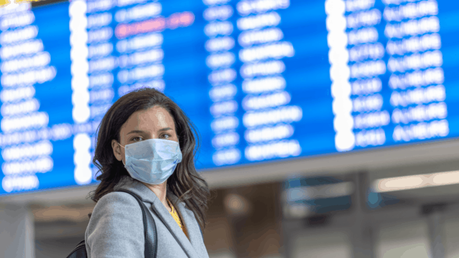
2. Emergency medical evacuation
The chances of you having a medical emergency are slim, and the chances of needing to be evacuated are even smaller. Experts estimate that this occurs once every 4,000 trips.
In other words, if you traveled three times per year, it would be 1,333 years before you filed an emergency evacuation claim.
However, just because it's an infrequent occurrence doesn't mean this type of coverage isn't worth it. It could cover something as simple as an ambulance ride to the hospital or something as dramatic as a medical jet to another country.
If you're somewhere very remote - perhaps trekking in Nepal or on a cruise ship in the middle of the ocean - it can easily cost six figures for an emergency medical evaluation. Factor COVID-19 into the mix, and you'll want the assurance that you can reach the nearest medical facility no matter where you are.
3. Trip cancellation
This is probably the number one reason people choose to purchase travel insurance. Unforeseen events may force you to cancel the trip at the last minute, and this coverage helps you recoup some or all of the costs.
Of course, you can't just cancel your trip on a whim and expect to get your money back. Nor is fear of traveling (due to COVID-19, for example) a covered reason to cancel.
Each company has its own list of covered reasons to cancel a trip. These might include:
- Flight cancellations and delays
- Illness or injury (yourself or a travel companion)
- Death of an immediate family member
- Jury duty
- Labor strike
- Natural disaster
- Military duty
- Unexpected job loss
- Terrorist attack at your destination or in your departure city
- A mandatory evacuation of your destination (i.e., hurricane or typhoon)
- Diagnosis of COVID-19 shortly before your departure date
Keep in mind that these are just examples. The individual policy you choose may offer different inclusions or exclusions. The most important thing you can do is compare policies and read the fine print.
The CFAR option
Bonus tip: Since the pandemic began, people have begun looking for a CFAR (Cancel For Any Reason) option.
As you might expect, you'll need to pay a lot more for this option. But if you feel nervous about traveling or you're concerned about your destination, it might be worth paying extra for this type of coverage.
How does CFAR work? You typically have up until 48-72 hours before your departure to cancel your trip. Depending on the policy, you can recoup between 50%-75% of your total travel costs. This is true if you're worried about the pandemic or you simply have a change of heart about your travel plans.

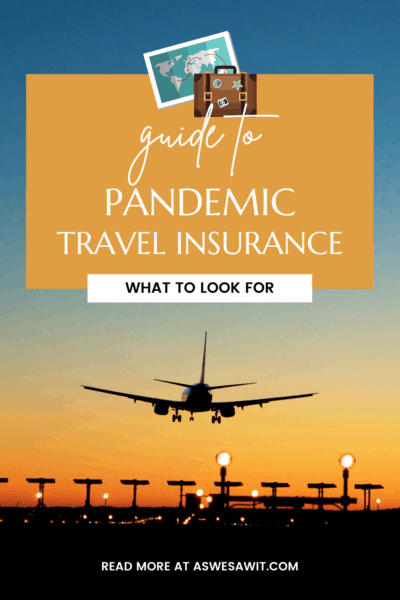
4. Trip interruption or travel delay
The examples we mentioned above don't only occur before your departure. Sometimes the unexpected can happen while you're already on holiday.
If there's an emergency back home, for example, this coverage will reimburse you for a one-way ticket home. It may also cover the unused portions of your trip (hotel, rental car, prepaid tours, etc).
What if you experience a significant travel delay due to severe weather, a canceled flight, or a similar situation? This type of coverage can cover the costs you'll incur during the interim, such as a hotel room for the night or taxi rides to and from the airport.
If you get sick with COVID-19 while you're abroad, you won't be able to travel home until you've recovered. However, if someone back home gets sick and requires your care, this is another scenario that would likely be covered by trip interruption insurance.
5. Professional travel assistance
No matter how well you prepare for your trip abroad, the unexpected can always happen. Venturing out into the post-pandemic world, you may find that your travel experience is very different than it was prior to 2020.
Another key benefit of travel insurance is the 24/7 travel assistance included with most policies. Whether there's a hurricane coming, your tour bus gets stranded, or you contract COVID-19, you can pick up the phone anytime and get the help and guidance you need.
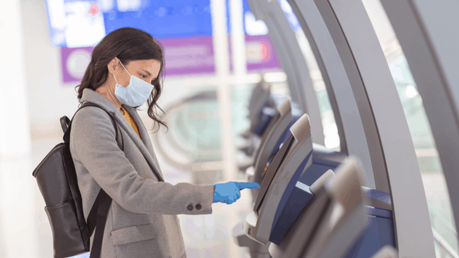
What's not covered by COVID-19 travel insurance?
The benefits of buying pandemic travel insurance are clear. To round out our discussion, though, let's make sure you understand what won't be covered by your insurance policy.
First, as mentioned earlier, fear of traveling is not an acceptable reason to cancel (unless you've purchased full CFAR coverage).
To enter some countries (such as the US, for example), you'll need to show proof of a recent negative COVID-19 test. Most travel insurance policies will not cover the cost of these tests. The exception could be if you become sick during your trip and a doctor orders the test.
Another scenario could be if the CDC issues a travel warning in your destination. These warnings urge people to avoid "non-essential" travel to the region, perhaps because of terrorist activity or a COVID-19 outbreak. In this case, your insurer may choose to cancel your policy or deny any claims you submit if you choose to travel despite the warnings.
None of us want to consider the possibility, but have you ever wondered what happens if you die overseas? Does life insurance pay if tragedy befalls you while you're traveling abroad? The answer is sometimes - depending on a number of factors.
The main takeaway is this: Things are changing fast in the post-pandemic world. Destinations that are freely open today may be restricted or even closed tomorrow. Other destinations may unexpectedly post requirements for vaccinations, negative COVID tests, or both.
For these reasons (and many others), your safest bet is to buy a comprehensive travel insurance policy for your trip.
You'll also want to do plenty of research and stay up to date on the latest conditions at your destination.
Final thoughts on travel insurance during the pandemic
So, what do you think? Do you need pandemic travel insurance?
The answer is a resounding YES!
Hopefully one day soon, all worries about COVID-19 and a global pandemic will be behind us. For right now, though, it's still a reality we have to face, even during our vacations.
As you start shopping around for COVID-19 travel insurance, refer back to this article for guidance. (Save it to Pinterest for easy reference.) Ensure you do plenty of research about current requirements or restrictions at your destination. Be prepared for things to change suddenly and always have a backup plan just in case.
If you follow this advice, there's no reason you can't enjoy a safe and successful holiday - even during the pandemic!
Did you enjoy reading this post? Do you feel more prepared for your upcoming trip? Check out our other recent travel planning articles to ensure you have everything you need.
Want to save this for later? Pin it to your favorite Pinterest board!
